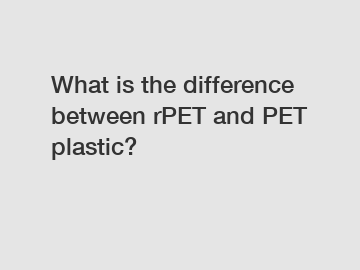What is the difference between rPET and PET plastic?
What is the difference between rPET and PET plastic?
In today's world, plastic is an integral part of our daily lives. From packaging to clothing, it is everywhere around us. Polyethylene terephthalate (PET) plastic is one of the most commonly used types of plastic. However, there is a growing awareness of the environmental impact of plastic and a need for more sustainable alternatives. This is where recycled PET (rPET) comes into play. So, what exactly is the difference between rPET and PET plastic? Let's dive into the details and explore this topic further.
1. The composition:

- PET plastic: PET is a thermoplastic polymer resin that is derived from fossil fuels, specifically petroleum.
- rPET plastic: rPET is made from recycled PET plastic, which is collected, cleaned, and melted before being formed into new products.
2. Environmental impact:
- PET plastic: PET has been widely used due to its durability and versatility. However, its production requires a significant amount of fossil fuels, contributing to carbon emissions and depletion of natural resources.
- rPET plastic: By using recycled plastic, rPET reduces the demand for new plastic production, thus conserving resources and decreasing carbon emissions. It promotes the recycling loop, reducing the amount of plastic waste in landfills and oceans.
3. Energy consumption:
- PET plastic: The production of PET plastic involves a complex process that requires high temperatures and involves multiple steps such as polymerization and extrusion. Consequently, it consumes a substantial amount of energy.
- rPET plastic: While the production of rPET also requires energy, it typically consumes significantly less compared to the production of virgin PET. This is because recycling plastic requires less processing, thereby reducing the energy footprint.
4. Quality and performance:
- PET plastic: Due to its characteristics, PET plastic is often chosen for its clarity, strength, and ability to retain carbonation. It is widely used in various industries, including packaging, beverage bottles, and textiles.
- rPET plastic: The quality and performance of rPET depend on the quality of the recycled material and the processing methods employed. Advanced recycling technologies have enabled the production of high-quality rPET that can match the properties of virgin PET.
Considering the differences between rPET and PET plastic, it is clear that rPET offers several advantages in terms of environmental sustainability. However, it is important to note that both types of plastic have their place in the overall transition towards a more circular economy.
The use of rPET helps reduce the consumption of raw materials and energy, as well as the generation of plastic waste. By choosing products made from recycled plastics, consumers and industries can contribute to a more sustainable future. Additionally, supporting the recycling industry encourages the development of innovative technologies and infrastructure necessary for an efficient recycling system.
In conclusion, the difference between rPET and PET plastic lies in their composition, environmental impact, energy consumption, and quality. While PET plastic is widely used and versatile, rPET plastic offers a more sustainable alternative by utilizing recycled material and reducing the demand for new plastic production. As we strive for a greener future, it is crucial to support recycling initiatives and embrace the use of recycled plastics in our daily lives.
Want more information on rPET pellets, rPET pellets, rPET pellets? Feel free to contact us.
90
0
0

Comments
All Comments (0)